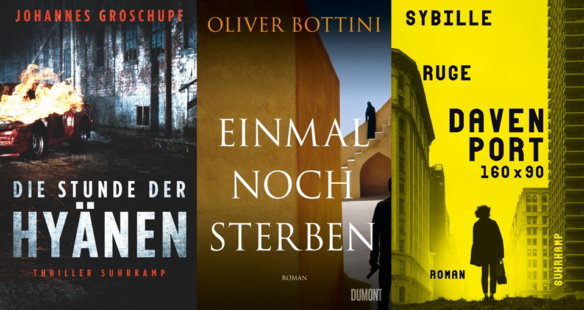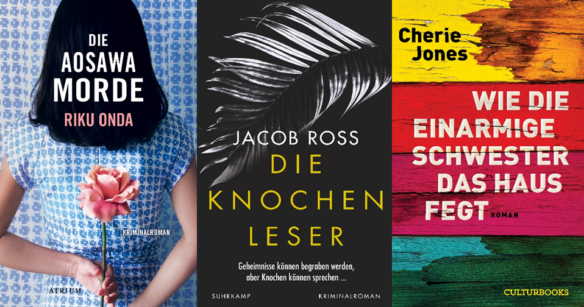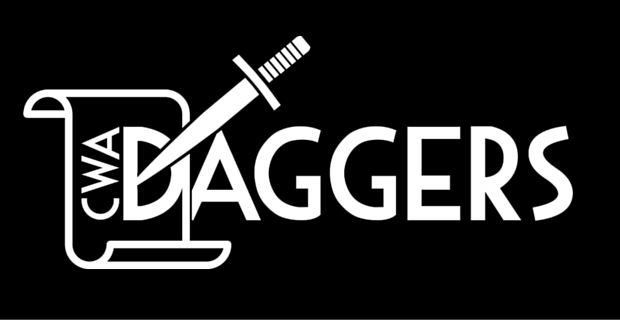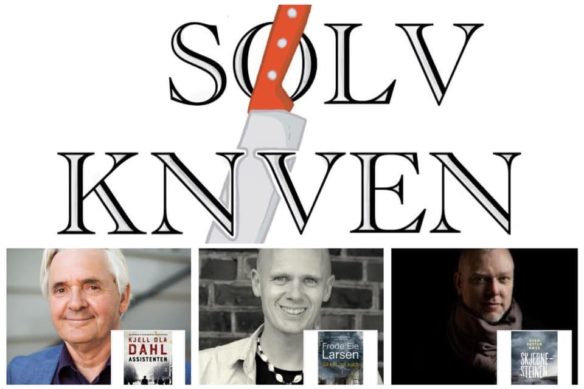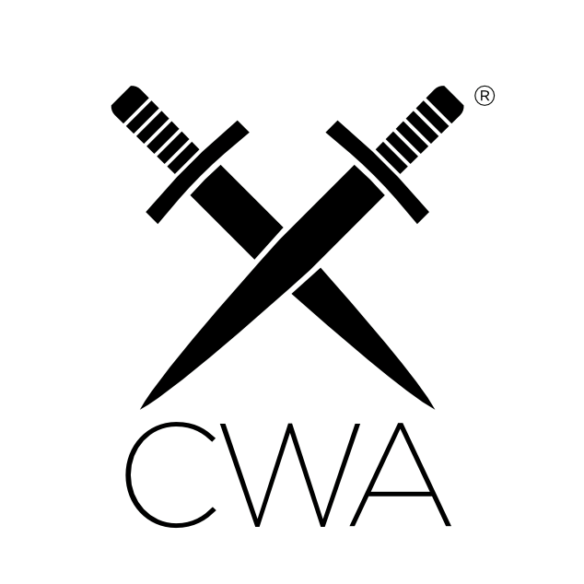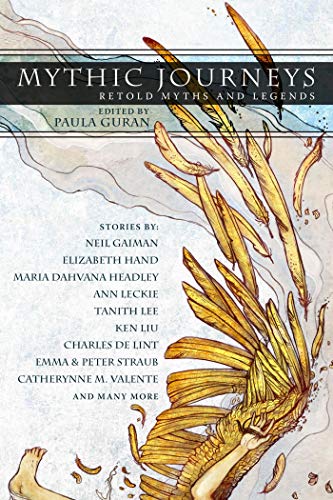(1) GAHAN WILSON TV. Episode One of Gahan Wilson’s Tales of Horror TV series debuted on Halloween at GahanWilson.net where it is streaming exclusively. They will be premiering one or two new episodes each month for the next two years. Episode One is “Phyllis” starring Bourke Floyd and Rachel Alig.
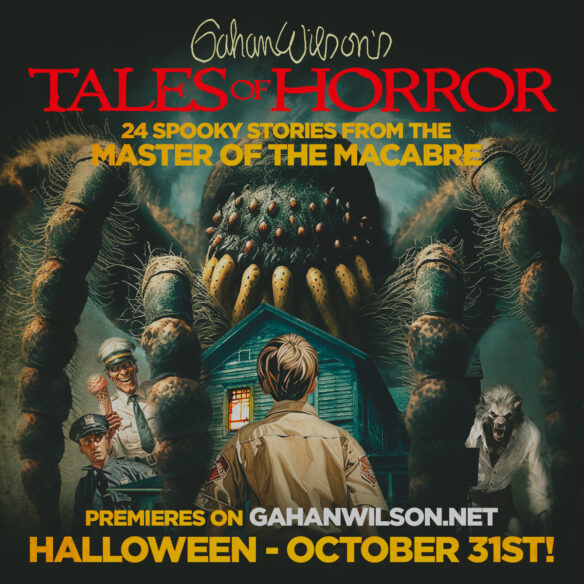
CHATGPT LOVES MY BOOK. [Item by Francis Hamit.]
STARMEN, A blended genre story merging Apache myths, witchcraft, science fiction, fantasy, history, detective, espionage, politics, and romance in a captivating narrative.
Had a conversation with ChatGPT that resulted in that promotional blurb.: Now I know a bit about AI from covering it during my trade magazine journalism career and my experiments with Artspace.ai. Any conversation with ChatGPT trains it to serve your needs but the “captivating narrative” bit at the end threw me for a bit. It seems almost human, doesn’t it, as if it has read the book.
So was that just a lucky accident or could the ChatGPT program have done this? Could it have reached into my computer and read my novel and then compared it to the thousands of other novels and their reviews that have been uploaded to its massive database? And now makes a value judgement like that?
It could do so in a nanosecond. There is an excerpt on Amazing Stories and other reviews of my other work online and several other books of mine in the Cloud at AWS..
Will ChatGPT become a literary arbiter because it will always know more than humans do. (And whose fault is that? We trained it.) I suspect that a ChatGPT review may become a default item for book promotion. I’m certainly going to use this just to see if it has any influence.
Two things; ChatGPT is also trained to be very polite so negative reviews are unlikely and a new book is now expected to get dozens of reviews from a variety of sources; publications, book bloggers, Book Tok influencers, etc. So it will not displace any human reviewer but be just another data point.
(3) MIKE ALLEN Q&A. West Virginia Public Broadcasting interviews writer, editor and publisher Mike Allen about “Sci-fi, Horror And Ghosts In Western Virginia”.
… Adams: I’m curious as to what you see when you look at Appalachia. What’s it look like from your perspective in the sci-fi/fantasy/horror world?
Allen: So here’s an interesting thing for me: Roanoke is unique. Some of it, I think, actually goes back to Nelson Bond having been based here, who was extremely active in the 1930s and ‘40s and ‘50s in the magazine scene that existed at that time. Writers like Sharyn McCrumb were making Roanoke, or at least the Roanoke region, their home base. Roanoke has this very robust culture for celebrating its writers, regardless of what they write. Those of us who are based here like myself, like Rod Belcher, who writes under the name R.S. Belcher, or Amanda McGee, who’s an up-and-coming writer whose work is definitely Appalachian and has a bit of witchery involved, we’ve experienced the benefit of that.
There’s no way for me to kind of sweepingly talk about everybody with an Appalachian connection. But there are some I do want to mention. Nathan Ballingrud, who lives in Asheville, is a horror writer who’s had some really high profile things happen lately. His first short story collection, “North American Lake Monsters,” was adapted into the Hulu series, “Monsterland.” The title story in that book, he considers to be an Appalachian story. I mentioned Rod Belcher whose novels have events in West Virginia and the Carolinas. Manly Wade Wellman might be the classic Golden Age writer who’s most associated with the Appalachians. He has a series of stories about John the Balladeer, or Silver John, who is a gentleman who has a guitar strung with silver strings. He wanders through this magical realist version of the Appalachian Mountains and has encounters that are very much based on Appalachian folklore….
(4) CHENGDU WORLDCON ROUNDUP. [Item by Ersatz Culture.] Today’s updates are briefer than planned, as I’ve been working on some other stuff, which might make it into tomorrow’s update.
Photos and video from the Iain M. Banks panel
This Weibo post has some photos from, and a brief write-up of, the Iain M. Banks panel. (A translated edition of Look to Windward has just been released in China.)
The same person also posted a subtitled video of a 7-minute clip from a Sky documentary, which seems like it was maybe shown during the panel.

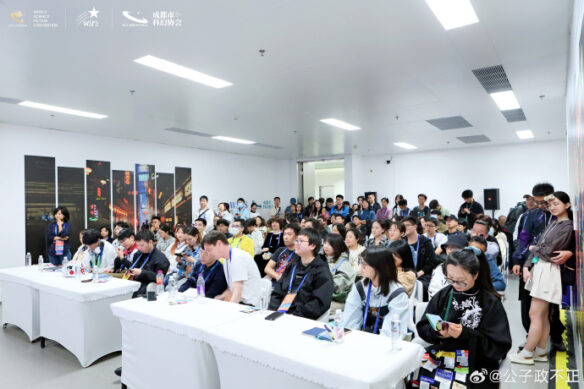

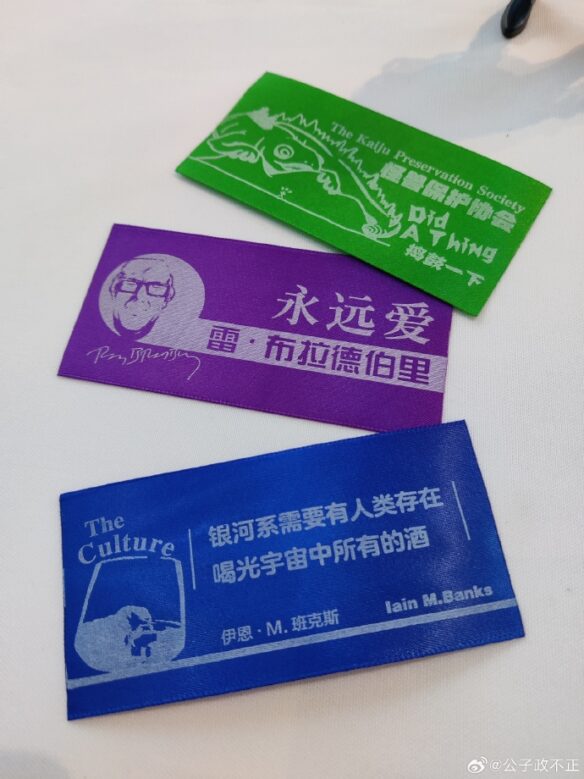
YouTube report from the con
I’ve only briefly skimmed this subtitled 19-minute video about the con, so I don’t know how worth watching it is. The source seems to be a reporter who normally covers Silicon Valley and the tech industry, so there’s a fair bit of stuff about the “businessy” panels as well as things more likely to be of interest to Filers. There’s a bit of footage from the panel/presentation Nnedi Okorafor was on.
Group photos from the con
It’s not clear to me if the person who posted this image gallery to Xiaohongshu was a volunteer or some other member of the con team, but some of the faces seen in the photos will be recognizable to Filers.


(5) SFWA RESPONDS TO GOVERNMENT CALL FOR COMMENTS ON AI. SFWA has posted the text of a letter the organization sent to the US Copyright Office about artificial intelligence – “SFWA Comments on AI to US Copyright Office” at the SFWA Blog.
On October 30, the SFWA Board and the SFWA Legal Affairs Committee sent the following letter to the US Copyright Office in response to their August 2023 Notice of Inquiry regarding copyright law and policy issues in artificial intelligence, which is part of their AI Initiative….
Quoting from the letter:
… it is with much regret that we cannot yet speak in favor of using AI technology in the business of creating art.
The current crop of artificial intelligence systems owes a great debt to the work of creative human beings. Vast amounts of copyrighted creative work, collected and processed without regard to the moral and legal rights of its creators, have been copied into and used by these systems that appear to produce new creative work. These systems would not exist without the work of creative people, and certainly would not be capable of some of their more startling successes. However, the researchers who have developed them have not paid due attention to this debt. Everyone else involved in the creation of these systems has been compensated for their contributions—the manufacturers of the hardware on which it runs, the utility companies that generate their electrical power, the owners of their data centers and offices, and of course the researchers themselves. Even where free and open source software is used, it is used according to the licenses under which the software is distributed as a reflection of the legal rights of the programmers. Creative workers alone are expected to provide the fruits of their labor for free, without even the courtesy of being asked for permission. Our rights are treated as a mere externality.
Perhaps, then, creative workers uniquely benefit from the existence of these artificial intelligence systems? Unfortunately, to date the opposite has been the case: SFWA has thus far seen mainly harm to the business of writing and publishing science fiction and fantasy as a result of the release of AI systems.
For example, short fiction in our genres has long been recognized as a wellspring of the ideas that drive our work as well as inspiring works in film, games, and television. Writers in our genres rely on a thriving and accessible landscape, which includes online and paper magazines. Part of the success of these publications depends on an open submission process, in which writers may submit their stories without a prior business relationship. This has frequently served as a critical opportunity for new and marginalized authors to have their voices heard.
Over the last year, these venues, particularly the ones that pay higher rates for stories, have been inundated with AI-written stories. The editors uniformly report that these submissions are poorly conceived and written, far from being publishable, but the sheer volume materially interferes with the running of these magazines. Once submission systems are flooded with such content, it takes longer to read and reject a submission than it took someone to have an AI produce it in the first place. Every submitted work must be opened and considered to verify that the writers for whom the system was originally designed are not missed or forgotten….
(6) JOANNA RUSS. LitHub provides readers with “Everything You Need to Know About Groundbreaking Queer Feminist Science Fiction Writer Joanna Russ”.
…Eventually Russ would find a way to channel that disjunction into a remarkable body of literature, including the revolutionary novel The Female Man (1975).
That novel and a selection of other novels and stories by Russ have now been collected and reissued by the Library of America. Not long ago, I sat down with the volume’s editor, Nicole Rudick, to talk about Russ’s life, work, and her reputation as one of the fiercest critics ever to write about science fiction.
… JM: Let’s talk about Russ’s development as a writer. She grew up in New York, went to Cornell. She studied with Nabokov, correct?
NR: True, though I think it’s a little overstated. She studied with him in her last year at Cornell and dedicated “Picnic on Paradise” to him and to S.J. Perelman, but I think she came to feel a little silly about that. She named them both as stylistic influences, and she and Nabokov certainly share a metafictional approach, but she talked a lot more throughout her life about George Bernard Shaw.
She grew up loving science, and was a top 10 finalist in the Westinghouse Science Talent Search in 1953. She graduated high school early, and then went to Cornell and switched over to literature. She said that she came out to herself as a lesbian privately when she was a kid and went right back in because she had no models. She didn’t feel that it was real, that it could be done. And that continued at Cornell, where things were pretty traditional in terms of gender roles. And then she went to Yale and studied playwriting but found that she was not very good at it. When she returned to New York, she worked odd jobs, did some theater work, and made some adaptations for radio at WBAI. She was also writing stories and publishing them in little journals and SF magazines.
In the late 60s, she started writing stories about Alyx. She said it was the hardest thing she ever did in her life, to conceive of a tough, independent female protagonist and get it on the page. Feminism was not widespread in the United States at that moment and Russ wasn’t involved in consciousness-raising groups or anything like that, so it was a solitary time to be writing these sorts of things. But they did well. Picnic in Paradise, her novella about Alyx, won a Nebula Award. And then in ‘67, she was back at Cornell, as a teacher, and in ‘69, there was a colloquium on women in the United States organized by the university in the intercession period—Betty Friedan and Kate Millett and a bunch of other panelists talking about sexuality, race, and why women see each other the way that they do. They approached these issues as social problems, not individual problems. Russ was there, and her description of it is so funny—“Marriages broke up; people screamed at each other who had been friends for years…. The skies flew open.” A wave of feminism washed over Cornell, and she sat down and wrote “When it Changed” in the weeks afterwards. Six months later, she saw a novel in the story and wrote The Female Man. But she couldn’t find a publisher. She wanted it published by a trade press and they all rejected it. The excuses were like, “There’s more feminism than science fiction”—that from Viking Press. A lot of women editors were baffled by it and turned it down. It finally got bought by Frederik Pohl [at Bantam Books] in 1975….
(7) CUTTING EDGE. The UK’s Crime Writers Association is expanding their Dagger Awards with two new categories: “Dagger awards adds categories for ‘cosy crime’ and psychological thrillers” in the Guardian.
The growing popularity of two crime fiction subgenres has prompted the creation of two new categories in the annual Crime Writers’ Association awards, including one for “cosy crime” – the subgenre of comforting mysteries that originated with Agatha Christie and is now most associated with Richard Osman.
The Daggers, as the CWA awards are known, recognise authors across 11 categories including historical crime, translated crime and lifetime contribution to crime writing. Next year, the two new awards will be the Twisted Dagger, for psychological thrillers, and the Whodunnit Dagger, for cosy crime….
(8) EATING THE FANTASTIC. Scott Edelman invites listeners to binge BBQ with the legendary Mike Gold in Episode 211 of the Eating the Fantastic podcast.

I’m extremely pleased I was able to convince the legendary Mike Gold to head out for dinner the night before the con began.
Gold entered the comic industry as DC’s first public relations manager. But as I was astounded to discover, he did some PR earlier than that — as the media coordinator for the defense at the Chicago Conspiracy trial, acting as the intermediary between the press and the likes of Abbie Hoffman and Jerry Rubin, when he was only a teen.
After DC, in 1983, he launched First Comics, where he edited Howard Chaykin’s American Flagg, Mike Baron and Steve Rude’s Nexus, Jim Starlin’s Dreadstar, Mike Grell’s Jon Sable Freelance, and many other classic series. Then after his move back to DC in 1986, he edited such titles as Legends, The Shadow, The Question, Action Comics Weekly, Green Arrow: The Longbow Hunters, Blackhawk, and others.
In 2006, he co-founded ComicMix, and in 2011, he received the first Humanitarian Award from the Hero Initiative. And — since he’s five years older than I am — meaning I would have read Fantastic Four #1 at age six, and Mike at eleven, five years counting for a lot back then — I enjoyed digging into our differing perspectives about the early days of comics.
We discussed the way his hiring at DC Comics was all Neal Adams’ fault, how the guerrilla marketing he learned from Abbie Hoffman helped him quadruple direct market sales, the Steve Ditko Creeper cover which sent a not-so-secret message to publisher Carmine Infantino, why editor Murray Boltinoff compared Marvel Comics to the Beatles (and not in a good way), which staffer was “the most disgusting human being I’d ever met in my life,” how First Comics was born, his secret weapon for getting creators to deliver their work on time, our differing contemporaneous exposure to Fantastic Four #1 (and how his related to Merrick Garland), the way an off-hand comment led to a classic John Byrne comic, how the comic book field is like a donut shop, and much more.
(9) TODAY’S BIRTHDAYS.
[Compiled by Cat Eldridge.]
- Born November 3, 1929 — Neal Barrett, Jr. Heavily nominated for many awards including a number of Hugos but he never won. He was Toastmaster at LoneStarCon 2. He was prolific writing over two dozen novels and some fifty pieces of short fiction including a novelization of the first Dredd film. As good much of his genre work was, I think his finest, best over the top work was the Wiley Moss series which led off with Pink Vodka Blues. He’s generously available at usual digital suspects. (Died 2014.)
- Born November 3, 1933 — Jeremy Brett. Still my favorite Holmes of all time. He played him in four Granada TV series from 1984 to 1994 in a total of 41 episodes. One source said he was cast as Bond at one point, but turned the part down, feeling that playing 007 would harm his career. Lazenby was cast instead. (Died 1995.)
- Born November 3, 1942 — Martin Cruz Smith, 81. Best remembered for Gorky Park, the Russian political thriller, but he’s also done a number of genre novels in The Indians Won (alternate history), Gypsy in Amber and Canto for a Gypsy (PI with psychic powers) and two wonderful pulpish novels, The Inca Death Squad and Code Name: Werewolf.
- Born November 3, 1952 — Eileen Wilks, 71. Her principal genre series is the World of Lupi, a FBI procedural intertwined with shapeshifters, dragons and the multiverse. Highly entertaining, sometimes considered romance novels though I don’t consider them so. The audiobooks are amazing as well!
- Born November 3, 1953 — Kate Capshaw, 70. Best known as Willie Scott in Indiana Jones and the Temple of Doom (which I’ll confess I’ve watched but a few times unlike the first film which I’ve watched way too much), and she was in Dreamscape as well. She retired from acting several decades ago.
- Born November 3, 1963 — Brian Henson, 60. Can we all agree that The Happytime Murders should never have been done? Wash it out of your consciousness with Muppet Treasure Island or perhaps The Muppet Christmas Carol. If you want something darker, he was a puppeteer on The Witches, and the chief puppeteer on Teenage Mutant Ninja Turtles. And he voices Hoggle in Labyrinth.
- Born November 3, 1977 — David Edison, 46. His Waking Engine series, beginning with the rather excellent Waking Engine novel, an urban fantasy set in the afterlife, would’ve been great. His only other novel, Sandymancer, merges fantasy and hard SF.
(10) IN THE SAME SPIRIT. “We Almost Got a Superhero Movie from The Exorcist Director William Friedkin” says Literary Hub.
In 1975, four years after the release of The French Connection, William Friedkin revealed to a reporter the inspiration for the film’s celebrated car chase scene.
It was the cover of a comic book: a man runs terrified on elevated tracks, just a few steps ahead of a train. He is handsome and athletic. Save for a domino mask, he is dressed like a classic Hollywood detective, in a blue suit and loose tie; he bears no resemblance to Gene Hackman’s slovenly everyman “Popeye” Doyle. The cover was from The Spirit, a comic that ran as a seven-page newspaper insert throughout the 40s and early 50s. The series, created by Will Eisner, was admired for its black humor, innovative compositions, shocking violence, and its setting in a precisely realized urbanscape. “Look at the dramatic use of montage, of light and sound,” Friedkin told the reporter. “See the dynamic framing that Eisner employs, and the deep, vibrant colors.”
Friedkin may not have been telling the truth. The comic he showed the reporter was a reprint that had been published after the release of The French Connection. The stories were three decades old, but the covers were new. Still, it was good publicity for the project he was then planning, a feature-length pilot for an NBC series that would feature the Spirit, aka Denny Colt, a detective who has risen from the dead, lives in a cemetery, and fights crime with his wits, his fists, and a willingness to withstand pain that borders on masochism….
(11) ITALIAN POLITICAL BRANDING USING LOTR. Jamie Mackay asks “How did The Lord of the Rings become a secret weapon in Italy’s culture wars?” in a Guardian opinion piece.
As a longtime fan of JRR Tolkien, I’ve long felt put out by Giorgia Meloni’s bizarre obsession with The Lord of the Rings. Over the years, Italy’s ultra-conservative prime minister has quoted passages in interviews, shared photos of herself reading the novel and even posed with a statue of the wizard Gandalf as part of a campaign. In her autobiography-slash-manifesto, she dedicates several pages to her “favourite book”, which she refers to at one point as being a “sacred” text. When I read the news this week that Italy’s culture ministry is spending €250,000 to organise a Tolkien show at Rome’s National Gallery of Modern and Contemporary Art, and that Meloni will attend the opening, I couldn’t help wondering: why? What is this government trying to achieve by stamping its mark so aggressively on one of the world’s most loved fantasy sagas?
My Italian friends don’t get the fuss. This is everyday politics, they say, a simple branding exercise to soften Meloni’s image. Perhaps. But there’s a deeper, and frankly stranger, side to this story. When The Lord of the Rings first hit Italian shelves in the 1970s, the academic Elémire Zolla wrote a short introduction in which he interpreted the book as an allegory about “pure” ethnic groups defending themselves against contamination from foreign invaders. Fascist sympathisers in the Movimento Sociale Italiano (MSI) quickly jumped on the provocation. Inspired by Zolla’s words, they saw in Tolkien’s world a space where they could explore their ideology in socially acceptable terms, free from the taboos of the past. Meloni, an MSI youth wing member, developed her political consciousness in that environment. As a teenager she even attended a “Hobbit Camp”, a summer retreat organised by the MSI in which participants dressed up in cosplay outfits, sang along to folk ballads and discussed how Tolkienian mythologies could help the post-fascist right find credibility in a new era….
(12) STREAMING TOP 10. JustWatch has released the top 10 streaming movies and TV shows for October 2023.
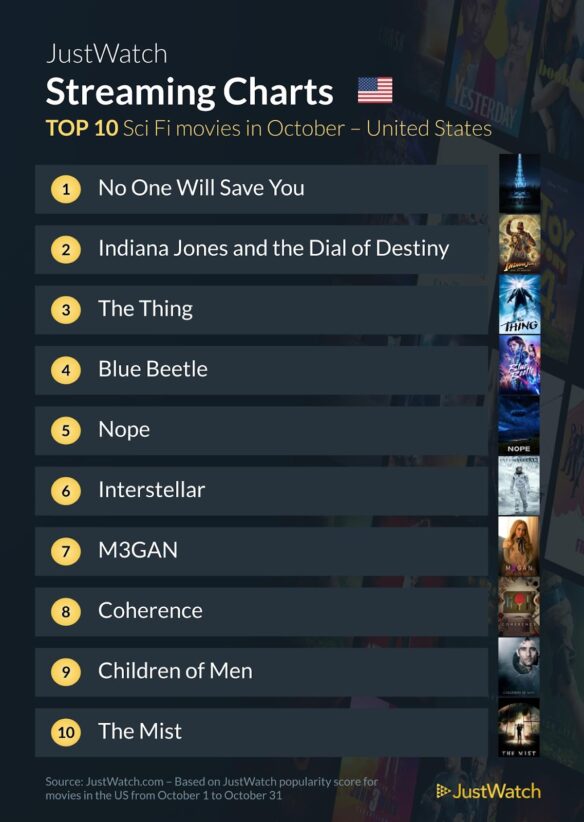
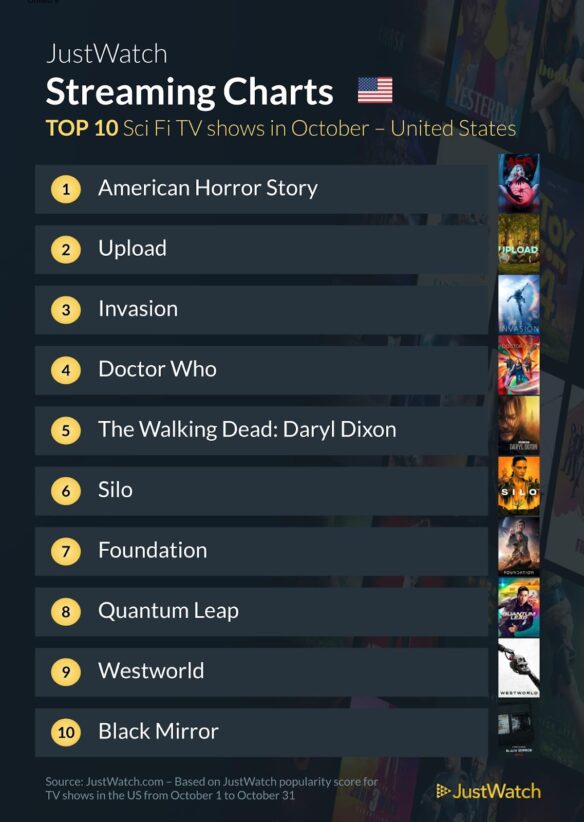
(13) VIDEO OF THE DAY. “Marvel Studios’ Echo” official trailer dropped today. The series begins streaming January 10 on @DisneyPlus and @Hulu.
[Thanks to Chris Barkley, Cat Eldridge, SF Concatenation’s Jonathan Cowie, Steven French, Francis Hamit, Mike Kennedy, Andrew Porter, Ersatz Culture, and John King Tarpinian for some of these stories. Title credit belongs to File 770 contributing editor of the day Andrew (not Werdna).]





